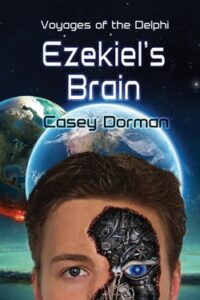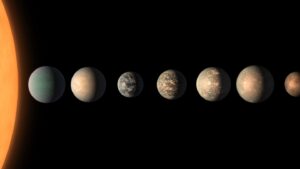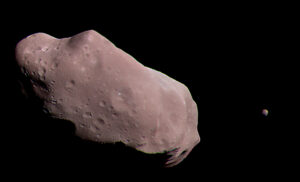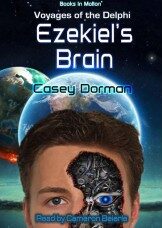Voyages of the Delphi, published by NewLink Publishing, a division of Mystic Publishers

When I was in a graduate student, I heard about a new TV series that was becoming the most-watched program on campus. It was called Star Trek, and after watching it, I joined the thousands of other students who spent the next day after each new episode discussing the ideas around which the previous night’s program had revolved. It was that kind of series—crafting plots that were metaphors for current social dilemmas or perennial philosophical ones.
The Voyages of the Delphi series is not a copy of Star Trek, but it tries to capture the flavor of the classic series. The spaceship Delphi, with a crew of androids, is on a mission to explore the galaxy, searching for life. One of the androids is a copy of a human brain, while the others are not. The human brain copy, named Ezekiel, has emotions, while the other androids do not. However, they each have their own personalities and special areas of expertise: a historian, a biologist, a philosopher, an autistic mathematical savant. In the second novel in the series, Prime Directive, they add a female human, who is not from earth and is an empath. The result is exciting space adventures with an interesting cast of crew members and adversaries and a series of difficult situations that cause both the Delphi crew and the reader to stretch their minds to understand what is at stake and how to resolve the dilemmas.
The Voyages of the Delphi Series
Ezekiel’s Brain (pub. date 2021) The story begins in 2023 when two self-conscious artificial intelligences are created. One of these is developed by DARPA, the United States Defense Advanced Research Projects Agency. The second AI is named “Ezekiel” and is an “emulation” — a copy of the brain of its creator, MIT Professor Ezekiel Job. The DARPA AI is programmed to “preserve humanity’s highest values.” However, the AI decides that humans are a threat to those values and exterminates the entire population The emulation AI, Ezekiel, remains hidden, still running in a secret room, cut off from the outside world.
Two hundred years later the descendants of the DARPA AI, which now have robotic bodies and call themselves “Solarians,” have established a civilization of AIs based upon the democratic model of ancient Athens. They have built city-states throughout the solar system and begun exploring planets surrounding other close stars. In a distant Solarian colony, the replication process for building more AIs spawns a mutation, which has the goal of consuming everything around it to build more copies of itself. The Solarians try to stop it, but their programming does not allow them to kill other AIs. They resurrect the emulation AI Ezekiel, who does not have those values, and copy some of his programming, including the ability to feel emotions, so they can fight the mutant AIs. After defeating the mutants in a massive space war, the Solarians decide to remove the emotional programming from themselves and return to their goal of exploration, but they include Ezekiel, with his human-like brain and emotions in their expeditionary crew to help them deal with aliens if they meet them.
On their first voyage of exploration the Solarians use an experimental “quantum drive” and arrive on Earth in a parallel universe where the human inhabitants have outlawed conscious AIs and are warring with one another and ruining their planet’s environment. Ezekiel convinces the humans to change course, and the Solarians return to their own universe and get ready to set out on more voyages of exploration, setting the stage for the next novel in the series.
Prime Directive (pub. date late 2023). Ezekiel and the AI crew of the Delphi visit a planet orbiting Proxima Centauri and find a race of humans. They meet Siaree, a human empath who senses waves of distressful emotions coming from a distant planet in orbit around the star Trappist-1 and decide to visit that planet to investigate, modifying the Delphi so that they may take Siaree with them.

When they reach Trappist-1 they find that one of its two habitable planets dominates the other and uses it as a prison colony for that planet’s race and for dissidents from its own planet, which is governed by a religious, totalitarian government. Rebels from both planets beg the Delphi crew to help them overthrow their repressive government, but the Delphi crew’s Prime Directive does not allow them to interfere in the conflicts of other races on other planets. When a war breaks out, they return to the prison-colony planet to learn more about a mysterious group of murderous giant insect-like creatures that appear to be alien visitors to that planet. They discover that the insects are robots, and soon the humans from the race that sent the robot insects arrive and begin bombing the inhabited Trappist-1 planets and demand they be given the planets’ resources.
The Delphi crew intervenes and defeats the intruding aliens in a space battle, then forces everyone to stop fighting and talk, but the aliens resume their attacks on the two planets. The Delphi crew don’t kill anyone but damage the alien ships, however the Trappist-1 inhabitants destroy all of the alien ships except three, which leave for their home planets. Ezekiel and the Delphi crew are fearful that those three ships will return with their full fleet, so they return home but with a plan to visit the alien planets to head off a future war.
Finding Gaia (sometime in 2024). Hero, the commander of the Delphi goes on trial for violating the Prime Directive when he and his crew interfered with the conflicts between the inhabited planets orbiting Trappist-1. Ezekiel defends Hero and the Commander is allowed to keep his command of the Delphi which leaves to travel to Gliese 832, the star system of the aliens who attacked Trappist-1. On Travoli, the home planet of the race from Gliese 832, the Delphi crew are imprisoned, but when the rulers of Travoli receive an urgent message from the three ships returning from Trappist-1 that they stopped to inspect a giant asteroid and all of their crew members were now killing each other, they ask the Solarians to rescue the ships. The Delphi takes one of the humans from Travoli with them on their ship along with their own crew, which includes the human empath, Siaree.

When the Delphi arrives at the asteroid, they find that all the Travolian crew members are dead. The asteroid is hollow and inside they find a habitable environment with an atmosphere, water, vegetation, and animal life, but no humans. It is a generation ship, but its human crew has disappeared. After visiting the asteroid, the Travolian becomes insane and attacks Siaree, then escapes to the asteroid, and the Delphi crew searches for him while trying to determine what causes the disease that leads humans to become insane and cannibalistic.
Ezekiel and the crew find a plant that releases a noxious gas that causes the strange disease that only affects humans. They learn that the humans had tried to preserve the natural environment inside the asteroid but eventually their efforts to save themselves began to destroy the rest of the environment. Gradually, the environment developed defenses against the humans.
Ezekiel, Hero, and Hypatia must find an antidote to the disease-causing substance then decide what to do about the asteroid, which is traveling to an unknown destination but remains toxic to any humans who discover it. They must find a way to allow the asteroid environment to live but remove its deadly aspect so they can send it on its way to complete its journey.
Sound exciting? Mind-stretching? Begin now by reading the first book in the series, Ezekiel’s Brain, available in paperback, Kindle, and audio editions on Amazon.
Read Ezekiel’s Brain on Amazon. Available in paperback and Kindle editions

Rather listen than read? Download the audio version of Ezekiel’s Brain from Amazon.

Subscribe to Casey Dorman’s Newsletter. Click HERE




